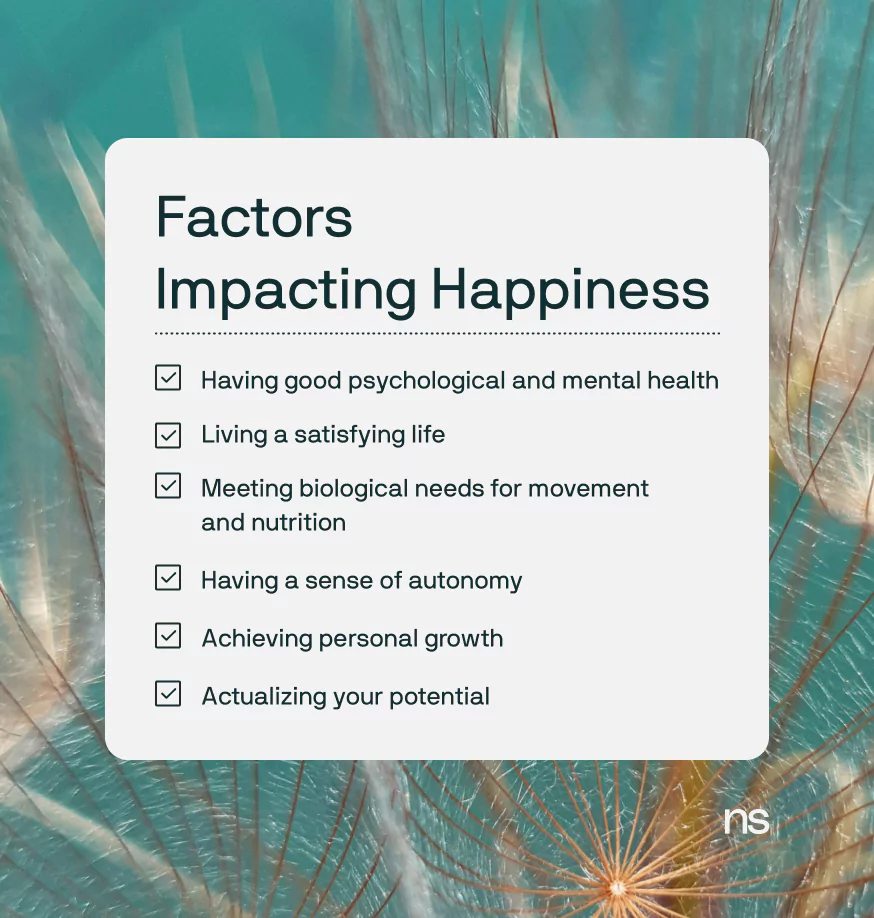Happy Habits: 9 Things You Can Do To Be Happier

Key Takeways
Happiness is a complicated concept, and researchers have been trying to understand the link between happiness and health for decades. This is because the way you experience happiness can depend on a wide variety of factors.
Not surprisingly, there’s some research to show that your level of happiness can impact your well-being.
So, how can being happy benefit your physical health? And what can you do to boost your own happiness and well-being?
Read on to learn more about the effects of happiness on your health, plus see the nine healthy habits you can implement for a happier life.
What are Happy Habits?
Happiness can be defined as a person’s experience of well-being in both their thoughts and feelings. Factors that contribute to your sense of personal happiness can include things like:

Some factors, like genetic and certain biological factors, may be out of your control. But there are small things you can do every day that can add up and make a big difference in your well-being.
Let’s get into the nine daily habits you can try out to boost your overall happiness.
9 Happy Habits to Implement into Your Daily Life

While there is no quick fix that can improve your happiness overnight, these simple habits are easy to incorporate into your daily routine, and may even help you improve your own sense of well-being.
1) Get Appropriate Exercise
Research shows that regular exercise and physical activity can have a significant effect on happiness. One study of 2,345 healthy adults found that people with high and moderate activity levels have much higher life satisfaction and happiness than those with a low activity level. However, this study examined correlation, not causation exactly. This means that there could be other undefined factors at play influencing both physical activity and happiness.
Other studies show that moderate-intensity aerobic exercise is the most beneficial type of exercise for people’s sense of well-being. Getting more exercise can also boost your energy levels and release endorphins.
Physical activity may also increase your sense of self-efficacy, which is a belief in your ability to accomplish goals. This is also linked to improvements in one’s sense of well-being.
2) Smile More

Smiling and laughing more can actually have a small effect on your perceived happiness. Studies have shown that facial expressions may influence your emotional experiences.
According to the study, smiling may make you feel happier, while scowling may produce negative feelings. However, more research is still needed to establish a direct link between facial expressions and emotional experiences beyond just a correlational effect.
3) Practice Meditation and Deep Breathing
Meditation and breathing exercises may potentially improve well-being. A recent 2021 study had participants attend nine months of mental training sessions where they practiced mindfulness techniques.
As participants went through the training sessions, they experienced an increase in their levels of life satisfaction and their ability to exercise control over their attention to negative emotions.
Other studies have shown that a greater meditation frequency is linked to increased self-kindness, self-compassion, observing, and awareness. These all may contribute to greater feelings of happiness.
4) Appreciate Others and Practice Gratitude

Studies show that practicing gratitude and adopting elements of a positive attitude can be a simple way to increase happiness. One study had participants either write about things they were grateful for or write about things that irritated them.
After 10 weeks, those who wrote about gratitude felt more optimistic and had a greater sense of well-being than those who wrote about feelings of irritation.
Another similar study had participants write about a topic such as daily hassles, a list of things they were grateful for, or neutral life events. The group that practiced gratitude showed a heightened well-being and a more positive outlook on life.
5) Get Enough Rest and Nourishment
Some research shows that people who sleep poorly or experience sleep deprivation are more likely to compare their lives to others and savor their positive experiences less. These effects may eventually lead to less happiness and increased stress.
On the contrary, people who get enough sleep tend to be more satisfied with life. More long-term research is still needed to confirm these findings and determine more causative links.
Other studies have shown that people who often had interrupted sleep may experience less slow wave sleep, which significantly lowers positive mood. This may help to partially explain the common link between insomnia and depression.
There’s also a connection between food and mood! Researchers continue to shed light on this fascinating link. Certain eating habits that include nutrient-dense foods providing adequate nourishment and antioxidant support may encourage improved mood.
6) Journal About Your Feelings

Writing down your feelings in a gratitude journal may help improve your sense of well-being. Research shows that just 15 minutes of journaling about positive topics over a period of 12 weeks decreased depressive symptoms and increased well-being and quality of life for the subjects.
Other studies have shown that expressive writing about thoughts and feelings can significantly decrease symptoms of depression in people with major depressive disorder. More research is still needed to confirm these findings.
7) Aim to Be Flexible
Researchers define psychological flexibility as the ability to recognize and adapt to various situational demands, and shift mindsets or behavior when needed. This can also mean being aware, open, and committed to behaviors that hold up to your set of values.
In studies, people with this skill tend to rely on personally meaningful values to guide their decisions and actions. This may lead to more frequent experiences of joy and meaning in life and less distress.
8) Spend More Time in Nature

Spending time in the great outdoors can do wonders for your well-being. Studies have shown that at least two hours of time outdoors per week can increase one’s sense of well-being and relieve stress.
This was true whether participants spent two straight hours outside or broke it up with several smaller visits to the outdoors over the week. Similar studies show that time outdoors may improve self-esteem and mood.
9) Spend Time with Loved Ones
Spending time with loved ones and creating meaningful relationships has also been linked to a happy life. The Harvard Study of Adult Development is a famous study that tracks the development of children through periodic interviews and health checks.
The goal of the study, which is still ongoing today, is to better understand how these children evolved and developed as they grow. Those who are still alive are still being monitored today, and most are in their 90s.
The study has found over almost 80 years that social connections and relationships are one of the most important factors for happiness.
Can Happiness Benefit Your Health?

So, what are some of the health benefits of increased happiness? Most research suggests that happiness can boost your immune system, reduce stress, benefit heart health, and even help you live longer.
May Boost Immune Health
Some research suggests that happiness can benefit your immune system. Studies show that negative emotions may impair immune response. People with a generally unhappy disposition may be at greater risk of illness than people with a happier disposition.
Research has also shown that exposure to stimuli that produce positive emotions, like good odors and positive pictures, may lead to an increase in antibodies and a decrease in cortisol.
Other studies have shown that older adults who have an optimistic and positive outlook had better immune responses to influenza vaccines, regardless of health status and medications they took.
A positive outlook has also been associated with a lower risk of developing an upper respiratory illness, regardless of illness type, age, sex, education, race, and body mass.
May Help with Stress

There is a lot of research that suggests a positive outlook can reduce stress. Studies have shown that a negative effect is associated with higher levels of cortisol, which is your stress hormone.
A positive effect is associated with lower levels of cortisol. One study of middle-aged men and women showed that a positive attitude is associated with reduced inflammation, a lower heart rate, and reduced neuroendocrine activity. However, the relationship here may be more complex than meets the eye and determining direct causative relationships may need more research.
May Improve Life Expectancy
A happy outlook may help people live longer. One study of U.S. adults found that, when compared to very happy people, the risk of death is 21 percent higher among people who are not happy.
People who reported being “pretty happy” as opposed to “very happy” were shown to have a seven percent increased risk of death. This may be because happiness is associated with less perceived stress, better coping strategies, and generally better health outcomes. Though it’s good to keep in mind that these are correlational connections, not proving causation.
May Protect Cardiovascular Health

Happiness may be associated with better cardiovascular health. Research has shown that happiness may have a positive effect on blood pressure.
One study of 72 healthy, non-smoking men found that a positive outlook was associated with lower cortisol levels and lower diastolic and systolic blood pressure. Diastolic blood pressure recovery after stress was quicker in participants with a positive outlook. Other studies have reported similar findings.
Research has also shown that an increase in optimism can decrease the risk of developing heart failure by 48 percent. Other studies have shown that satisfaction in one’s job, family, sex life, and self are associated with a decreased risk of coronary heart disease.
Get Your Happy Habits Tracker Here
Start tracking your happy habits each month with our helpful guide. Just download it below get started!
{{habit-tracker="/style-guide"}}
Can Being Happy Support Healthy Blood Sugar?
Surprisingly, happiness might in fact lead to better blood sugar levels! A recent 2020 study of 136 diabetic patients in Iran measured their levels of happiness based on a questionnaire, their fasting blood sugar, and their HbA1c levels.
The participants were divided into two groups. One group received mindfulness training, while the other did not. Researchers found that after the sessions, the mindfulness group reported higher levels of happiness.
As their level of happiness grew, their HbA1c and blood glucose levels were significantly lower compared to the control group.
These results are promising, but more research is needed to confirm this link between happiness and blood sugar.
Find the right Nutrisense programto turn insight into progress.
Go Beyond Glucose Data with Nutrisense
Your glucose can significantly impact how your body feels and functions. That’s why stable levels are an important factor in supporting overall wellbeing. But viewing glucose isn't enough. Nutrisense, you’ll be able to learn how to use your body's data to make informed lifestyle choices that support healthy living.
One-to-one coaching
Sign up to access insurance-covered video calls to work with a glucose expert: a personal registered dietitian or certified nutritionist who will help tailor your lifestyle and diet to your goals.
Monitor and measure what matters
With the Nutrisense CGM Program, you can monitor your glucose with health tech like glucose biosensors and continuous glucose monitor (CGM)s, and analyze the trends over time with the Nutrisense App. This will help you make the most informed choices about the foods you consume and their impact on your health.
Find your best fit
Ready to take the first step? Start with our quiz to find the right Nutrisense program to help you take control.

Heather is a Registered and Licensed Dietitian Nutritionist (RDN, LDN), subject matter expert, and technical writer, with a master's degree in nutrition science from Bastyr University. She has a specialty in neuroendocrinology and has been working in the field of nutrition—including nutrition research, education, medical writing, and clinical integrative and functional nutrition—for over 15 years.


.webp)

